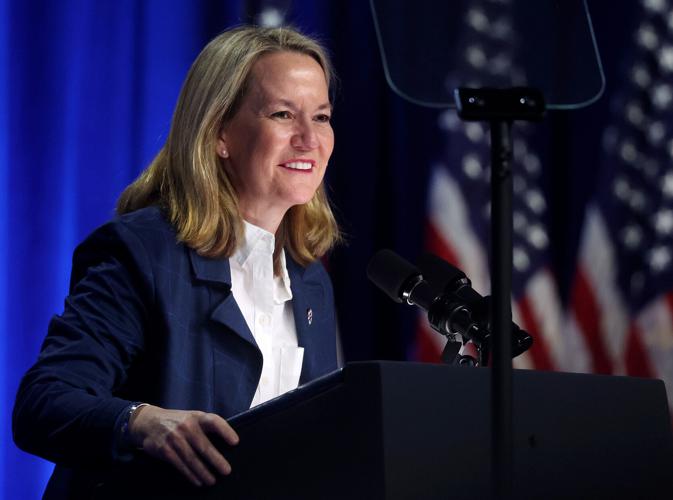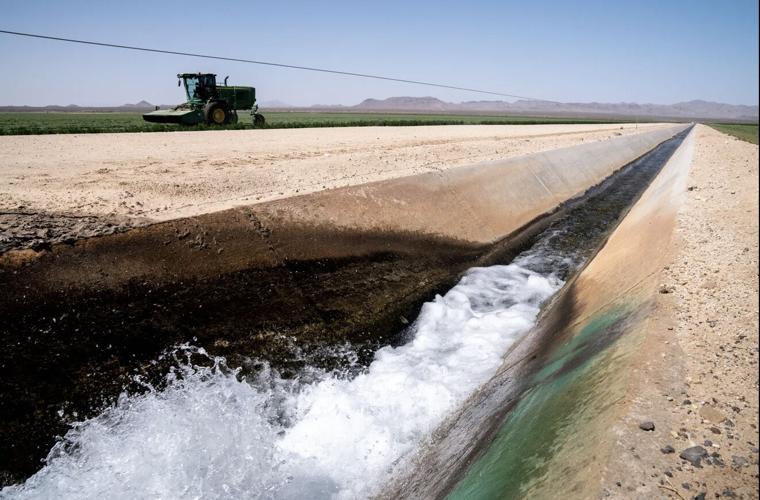PHOENIX — Arizona Attorney General Kris Mayes said Tuesday she will file suit “in the next two weeks’’ to halt groundwater pumping by a Saudi-owned corporate farm in rural western Arizona.
Mayes said she is “dead serious” about claiming in court that the farm operated by Fondomonte, including on some land leased from the state, is creating a nuisance by draining the water that others who live in the area need.

Groundwater is pumped into a canal to irrigate a field at Saudi firm Fondomonte’s Butler Valley Ranch near Bouse, Arizona, in La Paz County.
The law against nuisances allows her to take action, she said, after her fellow Democrat, Gov. Katie Hobbs, declined to cancel several state leases and after the Republican-controlled Legislature failed to enact a comprehensive program of groundwater restrictions in rural areas.
Challenges to Trump administration
In a wide-ranging news conference Tuesday, Mayes also said she is making preparations to sue if the Trump administration follows through with much of what’s in Project 2025.
She particularly focused on proposals to use the 1873 federal Comstock Act, still on the books, which bans interstate transport of obscene items. Mayes said she fears the Trump administration might try to use it to ban access to drugs used in medication abortions, and possibly birth control devices — and to subject women crossing state lines for abortions to government surveillance.
Mayes also said she is eyeing ways to challenge anticipated actions by Republican President-elect Donald Trump on immigration, ranging from mass deportations to eliminating the Deferred Action for Childhood Arrivals program started under the Obama administration that allows children brought into this country illegally to not only remain but also to work.
And she is reviewing existing abortion laws in the wake of Arizona voters’ approval in the Nov. 5 election of Proposition 139. Mayes said there are key questions that need to be addressed about which of those laws, such as requiring parental consent for an abortion, survive after voters put a fundamental right to abortion in the Arizona Constitution.

Arizona Attorney General Kris Mayes
“Dewatering” of La Paz County
But her most immediate action, she said, will be the pursuit of Fondomonte, the Saudi-owned firm that has land in La Paz County where it grows alfalfa to ship to the kingdom to feed dairy cattle there.
Mayes has not disputed that the company, at least on the surface, is not violating state laws. There are no statutory restrictions on those who own or lease land not located in designated groundwater “active management areas’’ to pump as much water as they say they need.
The state canceled one of its leases with the company last year. But Mayes noted the company still has other leases of state land that run until 2030. “I believe the governor should have canceled those leases,’’ said Mayes, Hobbs’ fellow Democrat. “But she did not.’’
That forces her to step in, the attorney general said.
“What are we going to do, allow the Saudis to completely dewater La Paz County?’’ she asked. “Is that fair to the people of La Paz County or to Arizona? I don’t think so. Just because the contact goes out until 2030, that’s not a reason to do nothing.’’

Swathers cut alfalfa at Saudi firm Fondomonte’s Butler Valley Ranch near Bouse in western Arizona.
Mayes said the problem extends beyond the governor and state-leased lands, as there are issues of farm operations on private properties outside the active management areas.
“We need the Legislature to get off its butt and help,’’ she said.
Hobbs has tried to distance herself from the fight, pointing out she inherited the problem. She told Capitol Media Services when asked about the Fondomonte issue, “you’d have to ask the Ducey administration about that,’’ referring to her predecessor, Republican former Gov. Doug Ducey.
Cochise County dairy also on Mayes’ list
Mayes has acknowledged that not just Fondomonte but the Riverview Dairy in Cochise County, which she also wants to take on, have been doing what state law allows: pumping unlimited — and unmonitored — quantities of groundwater.
But she contends none of that overrides laws that make it illegal for one property owner to create a nuisance that affects others. She now has the evidence, she said.
“I have hired two hydrologists out of this office. They are completing or have completed their analysis’’ to prove the farms’ water usage is damaging others, Mayes said.
She said not only does she plan to use the law about nuisances to halt pumping by Fondomonte, “I’m dead serious about using nuisance law to stop the Riverview Dairy from destroying the economy of Cochise County.”
Whether the law is as clear as she says remains to be seen.
State Rep. Jackie Parker, R-Mesa, pointed out earlier this year there is a state law that says farms are presumed not to constitute a nuisance “unless the agricultural operation has a substantial adverse effect on the public health and safety.’’
Parker also said it is the Legislature, not the attorney general, that sets policies on who can withdraw groundwater and how much.
Project 2025 challenges
Mayes also said she is prepping for a fight that may or may not materialize: Actions by the new president or the Republican-controlled Congress, after their inaugurations in January, to enact some of the provisions in Project 2025.
Put together by conservative organizations from across the country, many with ties to President-elect Donald Trump, it is described by its authors as a “menu of policy suggestions to meet our country’s deepest challenges and put America back on track.’’
Some are items beyond the purview of states, such as cutting government spending, increasing energy production and boosting accountability of federal agencies, including the FBI and the Justice Department, to the administration.
Mayes, however, is focusing on several recommendations she considers unconstitutional. Those include reviving the little-used, but never repealed, 1873 Comstock Act.
“That Comstock Act would effectively create a national abortion ban by prohibiting the mailing of drugs like mifepristone,’’ she said. That drug blocks the hormone that allows pregnancy to continue.
But Mayes said that it could be even more widely used, perhaps banning the shipment of drugs that prevent contraception.
“It also has a provision in it that would allow the federal government to surveil the women of this country as they seek reproductive care and as they travel across state lines,’’ she said. “Those kinds of provisions are unacceptable to the people of this country, to Arizonans.’’
Mayes said the provisions would also violate constitutional rights. Those include a right in the Arizona Constitution, dating to statehood, of people to be left alone in their private affairs; as well as the just-approved Proposition 139 that says people have a right to terminate a pregnancy.






